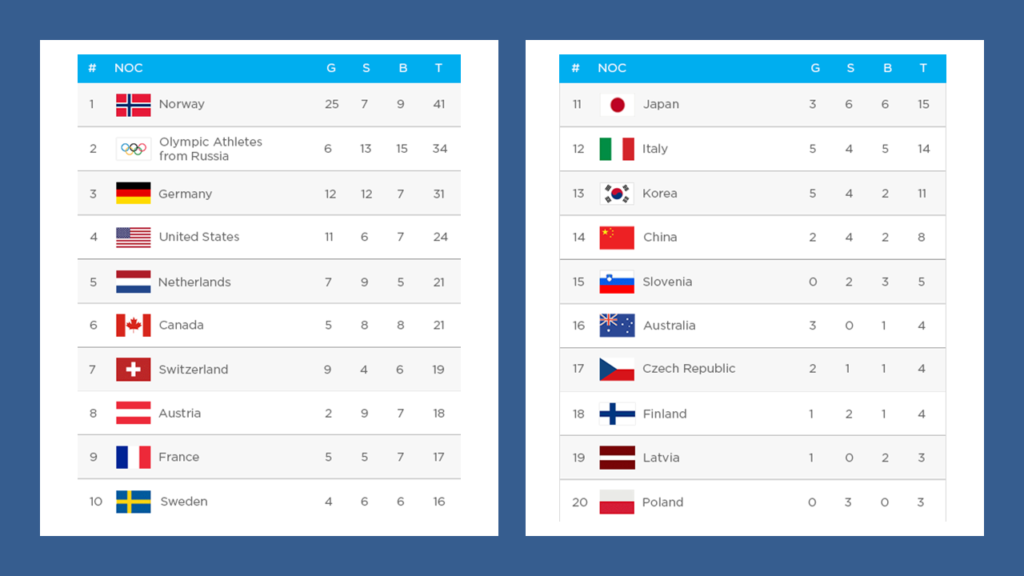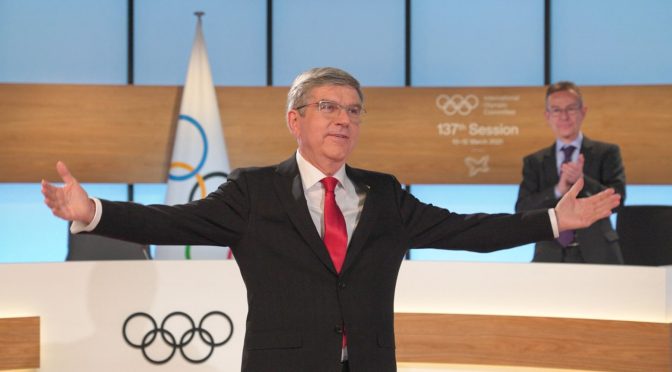China’s vaccine diplomacy took a twist this week with news emerging after this week’s virtual IOC Session that China has offered its vaccines to all participants of the next two Olympics – this summer in Tokyo and next February in Beijing. Well, “offered” is perhaps a touch generous, since IOC President Thomas Bach says the IOC will cover the costs. But already there has been some opposition…
Weekly Roundup
- China roles out its vaccine diplomacy playbook
- How well will China actually perform in 2022?
- Boycott threats from around the world
- Other features and stories in the build-up to Beijing 2022
China’s Vaccine Diplomacy
Initially seen as a global PR coup for China at a time when it’s desperately trying to change the narrative about the Beijing Olympics (i.e. counter calls for a boycott), this vaccine proposal is an extension of China’s vaccine diplomacy efforts already underway, involving the four vaccines that China has approved for use, as Bach made clear on Thursday:
“The Chinese Olympic Committee is ready in cooperation with the I.O.C. to make these additional doses available in two ways: either via collaboration with international partners, or directly in the numerous countries where agreements regarding Chinese vaccines are already in place.”
But just a day later, Japan declined this offer, with Japanese Olympic Minister Tamayo Marukawa saying that Japan had not been consulted by the IOC about the Chinese vaccines, and that Japanese athletes would not take them, adding that the vaccines have not been approved for use in Japan. As a “thanks but no thanks” message, it was a fairly clinical shutdown. Japan would, she said, continue with its policy of not requiring athletes to be vaccinated, even as Bach said that the IOC would “make every effort to have as many participants in the Olympics and Paralympic Games arriving already vaccinated in Japan this summer.”
China and Japan haven’t historically been the greatest of friends, so this shouldn’t come as a surprise, especially since there’s a sense of the Olympic host being told what to do here. But what will be interesting to see is how many other countries take Japan’s side, or willingly accept China’s vaccine diplomacy, aided by te IOC.
Meanwhile, the IOC Session that confirmed Bach’s re-election in a near unanimous vote drew some uncanny parallels with some other Sessions that have been going on in Beijing this month – rubber-stamped approvals and unanimous approval of the top man.
Here’s a thread I wrote on Twitter about how and where sports fit into China’s current political plans. It’s worth pointing out that this was very much a 2020 recap and 2021 planning session, so the 2022 Olympics don’t feature as much as one might think:
China’s Medal Hopes for 2022
It’s well known that host nations typically get a large bump in the medal count compared with previous years, but the latest research from the experts at Gracenote warns China not to get too excited. At all.

Five of the last nine host nations have won at least twice as many medals than they managed at the previous Winter Games, but Gracenote’s current data “does not show Chinese athletes delivering such an improvement in a year’s time”. Here’s the stark analysis:
China won nine medals total at the 2018 Winter Olympics in Pyeongchang. Three years on, the Chinese team is projected to win eight at Beijing 2022. China has never won a Winter Olympic medal in alpine skiing, biathlon, bobsleigh, cross country skiing, ice hockey, luge, nordic combined, skeleton or ski jumping. Current Gracenote projections have no Chinese participants ranked in the top eight of these sports for the Beijing 2022 Games.
China medal chances in Beijing are therefore probably restricted to curling, figure skating, freestyle skiing, short track, snowboard and speed skating. To double the number of medals China won in 2018, three quarters of the participants and teams ranked in Gracenote’s top eight in these sports would need to finish in the top three.
The one area where China may still have some hope is that its athletes have been perhaps less affected by the pandemic and have been able to train throughout the past winter. Additionally, with fewer international competitions and fewer chances to see Chinese athletes, there simply isn’t the recent data for Gracenote and others necessary to predict an improvement for China (should there have been one, that is). Then again, with China still playing catch up in the vast majority of winter sports, international competition is exactly what its athletes need. See also: China aims for best-ever medal haul in 2022 Beijing Winter Olympics [Xinhua, 2019]
Boycott Watch
There are plenty more stories on boycotts again this week, even as we’re starting to go round in circles. Mike Pompeo – still China’s Enemy #1 even after he’s left office – has called for the US to boycott the Beijing Olympics. Former UN Secretary-General and current chairman of the IOC’s ethics commission, Ban Ki-moon, is being asked to rule on an ethics complaint filed against the IOC. Congressman John Katko, mentioned in last week’s column, has written an editorial in USA Today titled Boycott Beijing: China commits genocide with one hand, hosts 2022 Olympics with the other, while former House Speaker Newt Gringrich and former Congressman Michael Waltz penned Why The 2022 Winter Olympics Need To Be Moved From Beijing. Meanwhile, the United States Olympic and Paralympic Committee (USOPC) has – again – said that it would not boycott the 2022 Olympics, with USOPC president Susanne Lyons saying that it would hurt athletes who had been training for competition. The White House has most recently said it would seek guidance from the USOPC.
As I also mentioned last week, China has now started to hit back at these boycott calls, with Government spokesperson Guo Weimin declaring calls for a boycott are “doomed to failure.” Meanwhile, Li Yingchuan, vice minister of China’s General Administration of Sport, said that those who call for a boycott are “slanderous, false, biased and cannot have any influence on the Olympic Games”, while the Global Times said the 180 human rights groups, which called for a boycott, are “primarily linked to organizations that support Xinjiang and Tibet independence, and Hong Kong’s violent protesters.”
See also: There Are Mounting Calls for a Boycott of the Beijing 2022 Winter Olympics. Will It Be Effective? [TIME], Critics question China’s right to host Winter Olympics [Politico], 2022 Winter Olympics will help Beijing ‘sportwash’ its human rights record [The Conversation], Shiffrin calls for “more consideration” when selecting Olympic hosts amid Beijing 2022 controversy [Insidethegames]
Other Stories and Links
- Lim Hyo-jun may not compete in the Olympics for China [Dong-A Ilbo]
- South Korea short track star reportedly bids to skate for China at Beijing Olympics [NBC Sports]
- 2 New Light-Rail Links To Open [That’s Beijing]
- Yanqing competition zone for Beijing 2022 to enter game time operation in October [Xinhua]
- Canada, Sweden favorites at Beijing 2022 men’s ice hockey [Xinhua]
- Hockey Canada planning orientation camp ahead of Beijing Olympics [Sportsnet]
- Italian coach witnesses China’s winter sports growth [Xinhua]
- Winter sports snowballing as Beijing 2022 nears [Xinhua]
- Beijing on home stretch for 2022 Winter Olympics [Xinhua]
- Ski resort in NE China witnesses growth in winter sports sector [CGTN]
- High praise for test events [China Daily]
See also:
- 48 Weeks To Go: Counter-Attacks & Paralympic Prep
- 49 Weeks To Go: Testing, Testing, Testing
- 50 Weeks To Go: Corporate Conundrums & Olympic Agendas
- 51 Weeks To Go: Boycotts & Hockey Fights
- Safe and Simple: Beijing 2022’s Message with 1 Year To Go
To keep up-to-date with all the latest news from China Sports Insider, please click on the “SUBSCRIBE” button in the top right corner of this page (or see below on mobile version or click here from email version). Also follow along on Twitter for regular updates.


